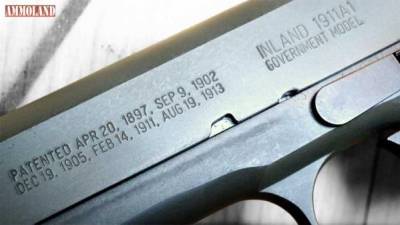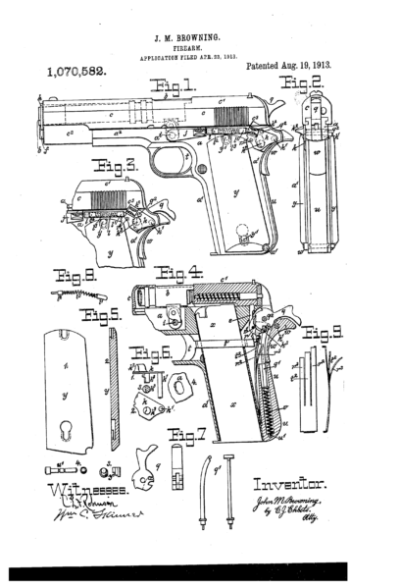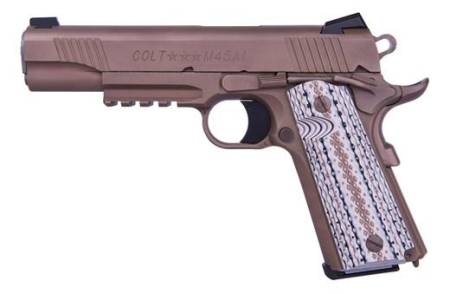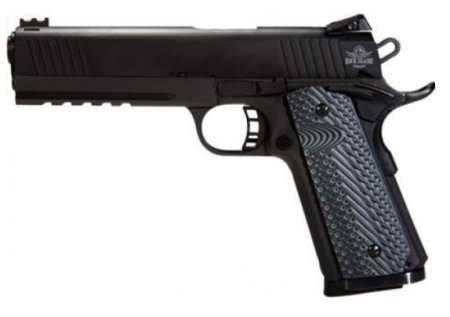The 1911 - A History of Improvements
One of the most popular handguns in the world is the “1911”. It was adopted by the United States Armed Forces and designated the M1911, where it was THE standard-issue sidearm from 1911 until 1985. And an updated version of the M1911A1, designated the M45A1, remains the standard-issue sidearm for the US Marine Corps (USMC) Systems Command and U.S. Marine Corps Forces Special Operations Command (MARSOC).
I was recently having a discussion with a “gun guy” about some improvements to the popular 1911 pistol. To my surprise, he balked at the idea of ANY improvements to the 1911. He literally stated, “How can anyone improve upon perfection?”
Upon discussion, he actually thought that John Moses Brown, the inventor of the 1911 pistol, was so brilliant that his first design had survived for over 100 years without any changes!
All you have to do is look at an older Colt 1911 slide that has patent dates listed on it, and you’ll see that the first patent was in 1897… followed by another in 1902. The U.S. Military adopted the 1911 version (and designated it the M1911). And, while most people are unaware of the change made in 1913, it was significant… and included in all M1911s manufactured after that date.
In his 1913 patent application, Browning states that the intention was to simplify the pistol by providing “improved construction” of some parts which would, in turn, allow each of them to “perform several distinct functions.” This would reduce the overall number of parts in the gun and – most importantly – “the entire arm may be assembled or dismounted without requiring the use of any tools.”
Among the many changes, Browning redesigned the grip and frame safety, simplifying their internal design and multi-function while still maintaining their intended purpose. Browning noted that this “manually operated combined slide-lock and hammer-lock” would now make the gun “positively safe against discharge” despite the condition in which the gun was being carried by soldiers in the field.
Not fully satisfied with the safety that Browning designed into his 1913 version, during the series of changes that Colt made later, they added a firing pin block safety (aka a “drop safety”) in 1983. This was one of the changes made in the Series 80 model. A pivoting link is actuated by the trigger pull, pushing the firing pin block up and unblocking the firing pin. Thus, the firing pin can only move IF the trigger is pulled. Many critics of this change (including some manufacturers) modify their 1911 pistols to better align with the Series 70 model.
To achieve the goal of allowing the gun to be disassembled without any tools, one of the ways this was accomplished was by simply redesigning the spring and its housing between the frame safety and the slide lock. By allowing the now-slightly-bent spring to essentially hold itself in tension between the safety and lock, Browning was able to eliminate a locking pin and frame stud. Fewer parts meant faster production, less cost, and easier assembly and disassembly.
The next major change took place in 1924… with which the U.S. Military changed the designation of the pistol to M1911A1.
The below video describes the most significant differences between the M1911 and the M1911A1.
In 1985, the Beretta 92F 9mm semi-automatic pistol was adopted by the United States military as their service pistol and designated the M9. It should be noted that this change was primarily motivated by politics… in order to standardize the U.S. Military with its NATO allies, who had standardized to the 9mm NATO cartridge. As the M1911A1 was phased out… over several years, the M9 was met with mixed reviews. In 2017, the M9 was replaced with two customized versions of the SIG Sauer P320 9mm semi-automatic pistol. A full sized version was designated the M17 and a smaller, carry version designated the M18.
However, modernized derivative variants of the M1911A1 continue to be used by some units of the U.S. Army Special Forces, U.S. Marine Corps (as the Colt M45A1 Close Quarter Battle Pistol) and the U.S. Navy. Variants of the M1911A1 are also used by the Los Angeles Police Department SWAT and S.I.S., the FBI Hostage Rescue Team, FBI regional SWAT teams, and 1st Special Forces Operational Detachment—Delta (Delta Force).
The Improvements Continue... with the M45A1
As mentioned above, the M45A1 (used by the USMC) is a modernized M1911A1. While there are too many differences to cover here, some of the key changes are:
- A Decobond™ Brown Coated Stainless Steel Slide & Frame
- M1913-spec Picatinny rail (for mounting lights, lasers, and other accessories)
- Dual Recoil spring system (to reduce felt recoil while extending recoil spring life) - with a short Guide Rod
- Novak tritium front and rear three-dot night sights
- Serrations added to the front portion of the slide (as well as the rear serrations remaining)
- Ambidextrous Thumb Safety and extended Grip Safety
- G10 Checkered Desert Camo Grips (with Magwell cut)
- Extended trigger (as appeared on the original M1911 design)
- Based on Series 80 design
- A lanyard loop (below the handle grip)
Read a review of the Dual Recoil Spring system approach at: COLT 1911 DUAL RECOIL SPRING TEST - Part 1 & COLT 1911 DUAL RECOIL SPRING TEST - Part 2. Also, read COLT M45: A CLOSER LOOK AT THE DUAL RECOIL SPRING SYSTEM.
However, it's difficult to justify spending $1699.00 (MSRP) on a Colt M45A1 when MANY of these same improvements are in the Rock Island Armory TAC Ultra FS - 45 ACP (owned by Armscor - the worlds largest producer of 1911 style pistols) for only $775 (MSRP). This is a fantastic M45A1 equivalent:
- Built with 4140 Ordnance steel finished with a Parkerized Matte Coating
- M1913-spec Picatinny rail (for mounting lights, lasers, and other accessories)
- A Full Length Guide Rod
- Front Sights - Dovetail Fiber Optic / Rear Sights - LPA MPS1 Adjustable
- Serrations added to the front portion of the slide (as well as the rear serrations remaining)
- Ambidextrous Thumb Safety and extended Grip Safety
- G10 tactical grips (with Magwell cut)
- Based on Series 70 design (typically in the higher end pistols)
- A skeletonized hammer and trigger with adjustable over travel stop.
Don't let the comparatively low price fool you. On Nov. 19, 2018, Armscor announced that, after extensive qualification testing, they had signed a deal to supply the Armed Forces of the Philippines (AFP) with 50,000 pistols. The first pistols delivered were of the Armscor Rock Island Armory “TAC Series”.
Check out the below video review of the Rock Island Armory TAC Ultra FS - 45 ACP. You may even prefer it over the Colt M45A1.





